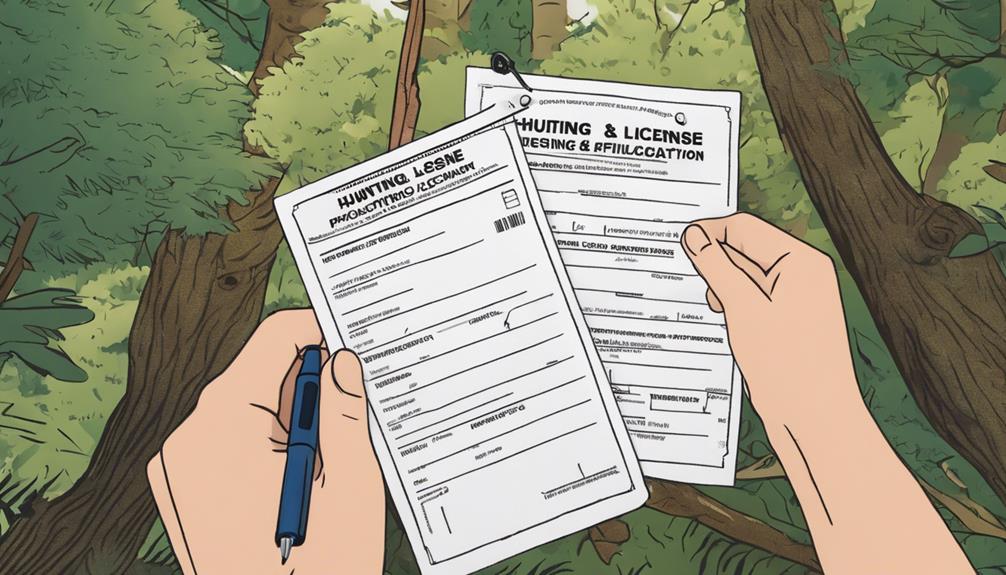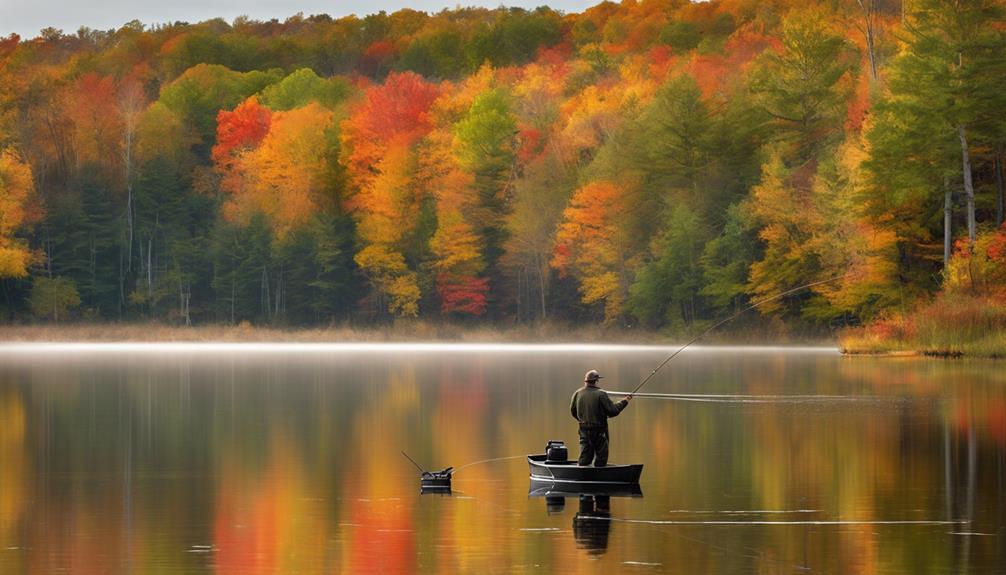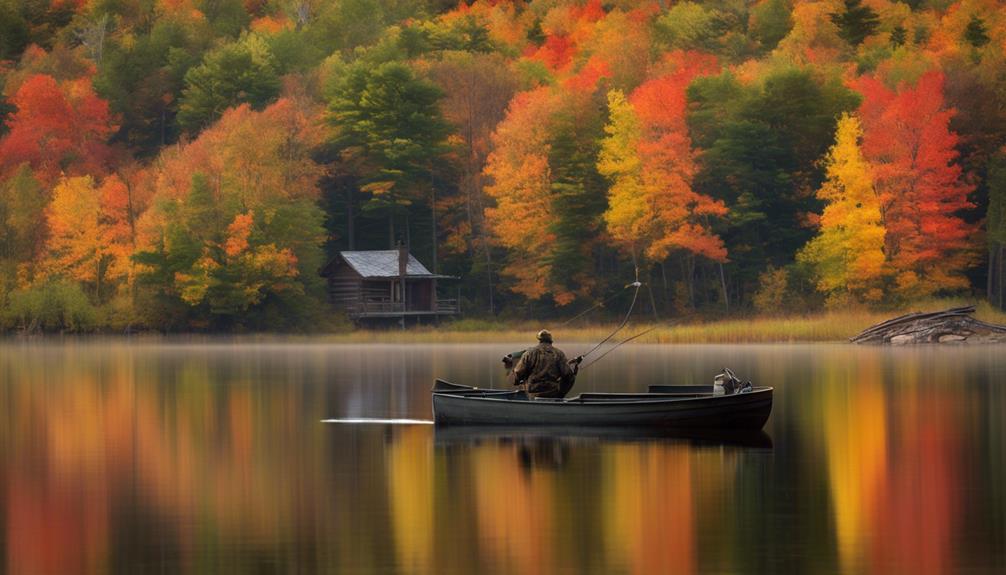When you think about hunting and fishing in Wisconsin, the importance of the Hunting and Fishing License Permit Bond can't be overlooked. This bond not only ensures you're compliant with state wildlife regulations but also plays a significant role in protecting our natural resources. Have you considered what might happen if you don't adhere to these laws? Understanding the implications of non-compliance could change how you approach your outdoor activities. Let's explore the details that could impact your experience in the great outdoors.
Overview of the Bond

A hunting and fishing license permit bond is a crucial financial guarantee that ensures compliance with state regulations while engaging in these outdoor activities.
This bond acts as a security measure, protecting the state and the public from potential violations of wildlife laws and regulations. When you obtain this bond, you're essentially agreeing to abide by the rules set forth by your state's wildlife agency.
The bond amount typically varies based on state requirements, but it's designed to cover any fines or penalties you might incur from failing to comply with hunting and fishing laws.
If you were to violate these regulations, the bond can be used to pay for any damages or fines, offering a layer of protection to both you and the state.
Importance of Compliance
Understanding the importance of compliance with hunting and fishing regulations can't be overstated. When you follow these rules, you not only protect wildlife and their habitats but also ensure the sustainability of resources for future generations.
By adhering to established guidelines, you contribute to conservation efforts, which are vital for maintaining healthy ecosystems.
Moreover, compliance keeps you safe and helps you avoid legal issues. Violating regulations can lead to hefty fines, loss of your hunting or fishing privileges, and even criminal charges. You don't want your recreational activities marred by unnecessary complications.
Staying informed about the rules in your area, including seasonal limits and licensing requirements, is essential.
Additionally, compliance fosters a sense of community among outdoor enthusiasts. When everyone follows the same rules, it creates a fair and enjoyable experience for all.
Respecting regulations also enhances your reputation as a responsible hunter or angler, allowing you to engage positively with fellow enthusiasts.
Ultimately, your commitment to compliance reflects your dedication to ethical practices. By prioritizing adherence to hunting and fishing laws, you help preserve the natural environment while enjoying your outdoor adventures responsibly.
Application Process

To obtain a hunting and fishing license, you'll typically follow a straightforward application process that varies by state.
First, check the specific requirements for your state, as they can differ widely. You'll need to decide whether you're applying for a hunting license, a fishing license, or both.
Next, gather the necessary documentation, which may include proof of residency, identification, and any prior licenses if applicable. Some states require completion of a hunter safety course, so make sure you've completed that if needed.
Once you've prepared your documents, you can usually apply online, by mail, or in person at designated locations like wildlife offices or sporting goods stores.
When applying online, you'll fill out the application form and upload any required documents. If you're applying by mail, be sure to send copies of your documents with your application.
After submitting your application, you may need to wait for approval, which can take varying lengths of time. Keep track of your application status if your state provides that option.
Once approved, you'll receive your hunting and fishing license, allowing you to enjoy your outdoor adventures legally.
Costs and Fees
When you're budgeting for your hunting and fishing license, it's essential to consider various costs and fees that can vary significantly by state and type of license.
First, you'll need to look at the base cost of the license itself. In Wisconsin, for instance, a fishing license can range from $20 to $50, depending on whether you're a resident or non-resident and the duration of the license.
Besides the license fee, there are often additional costs, such as processing fees, which can add to $15 to your total.
If you're planning to hunt, you might also need to pay for specific permits, which can vary based on the species you're targeting. For example, a deer hunting permit can cost around $30 for residents.
Don't forget about any educational or safety courses you might need to take, which can set you back another $25 to $100.
Lastly, be aware of any potential taxes or surcharges that may apply.
Duration and Renewal

Hunting and fishing licenses come with specific durations that dictate how long you can enjoy your outdoor pursuits. Generally, these licenses are issued for a year, starting from the date of purchase. This means you'll need to keep track of when your license expires to ensure you stay compliant while enjoying your activities.
Renewing your license is a straightforward process. You can usually do it online, by mail, or in person at designated locations. It's a good idea to renew your license before it expires, so you don't miss out on your hunting or fishing opportunities. Many states also offer the option for multi-year licenses, giving you the convenience of not having to renew each year.
Be mindful that if you're hunting or fishing in different seasons, you may need separate licenses for each activity, and their durations can vary. Always check the specific regulations for your state to ensure you've got the right licenses for your endeavors.
Consequences of Non-Compliance
Failing to keep your hunting or fishing license up to date can lead to serious repercussions. If you're caught hunting or fishing without a valid license, you could face hefty fines that can put a dent in your wallet. These fines vary depending on the severity of the violation, but they can quickly add up, especially if you're cited multiple times.
In addition to financial penalties, you might also face the suspension or revocation of your hunting or fishing privileges. This means you could miss out on your favorite outdoor activities for a significant period, impacting not just your enjoyment but also your ability to gather food if you rely on fishing or hunting for sustenance.
Worse yet, in some cases, you could even face criminal charges, which can lead to a permanent mark on your record. This could affect future employment opportunities, especially in fields where integrity and responsibility are paramount.
Resources and Support

Navigating the complexities of hunting and fishing regulations can feel overwhelming, but there are plenty of resources and support available to help you stay on track. Start by visiting your state's Department of Natural Resources website, where you'll find valuable information on licensing requirements, regulations, and local wildlife management. They often provide downloadable guides and FAQs to clarify any questions you may have.
Don't forget about local conservation organizations. Many offer workshops, seminars, and community events designed to educate hunters and anglers about best practices and legal obligations. These groups can also connect you with fellow enthusiasts who share your interests and concerns.
If you're looking for real-time assistance, consider reaching out to local game wardens or law enforcement officers. They're a great resource for clarifying regulations and ensuring you're compliant.
Social media groups and forums can also be helpful, as they allow you to engage with experienced hunters and fishers who can share their insights.
Lastly, keep track of any changes in regulations by subscribing to newsletters or alerts from your state's wildlife agency. Staying informed will help you enjoy your outdoor activities while remaining compliant with the law.
Conclusion
In summary, the Wisconsin Hunting and Fishing License Permit Bond is essential for ensuring you comply with state wildlife regulations. By securing this bond, you not only protect natural resources but also contribute to sustainable outdoor practices. Remember, staying informed about the application process, costs, and renewal will help you enjoy your outdoor activities legally. Embrace your role in conservation, and you'll be part of a community dedicated to preserving Wisconsin's wildlife for future generations.

